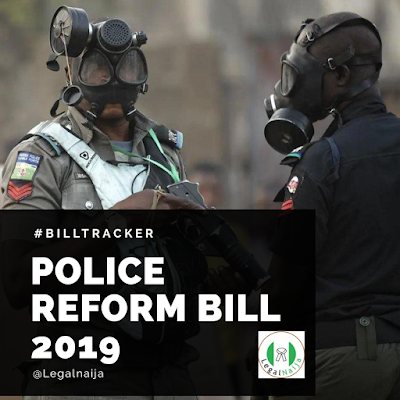
On Wednesday the 17th of April,
2019, the Nigerian Senate passed the much awaited Police Reform Bill, 2019. The
Bill seeks to amend the Police Act which had been drafted since the 1960s but has
never been amended. According to experts the Police Act is out of tune with
current realities and requires urgent amendment. The Senate Bill has been forwarded to the
House of Representatives for concurrence before it may be forwarded to the
President for his assent. This post seeks to enlighten you about some of the
relevant provisions in the Police Reform Bill including –
2019, the Nigerian Senate passed the much awaited Police Reform Bill, 2019. The
Bill seeks to amend the Police Act which had been drafted since the 1960s but has
never been amended. According to experts the Police Act is out of tune with
current realities and requires urgent amendment. The Senate Bill has been forwarded to the
House of Representatives for concurrence before it may be forwarded to the
President for his assent. This post seeks to enlighten you about some of the
relevant provisions in the Police Reform Bill including –
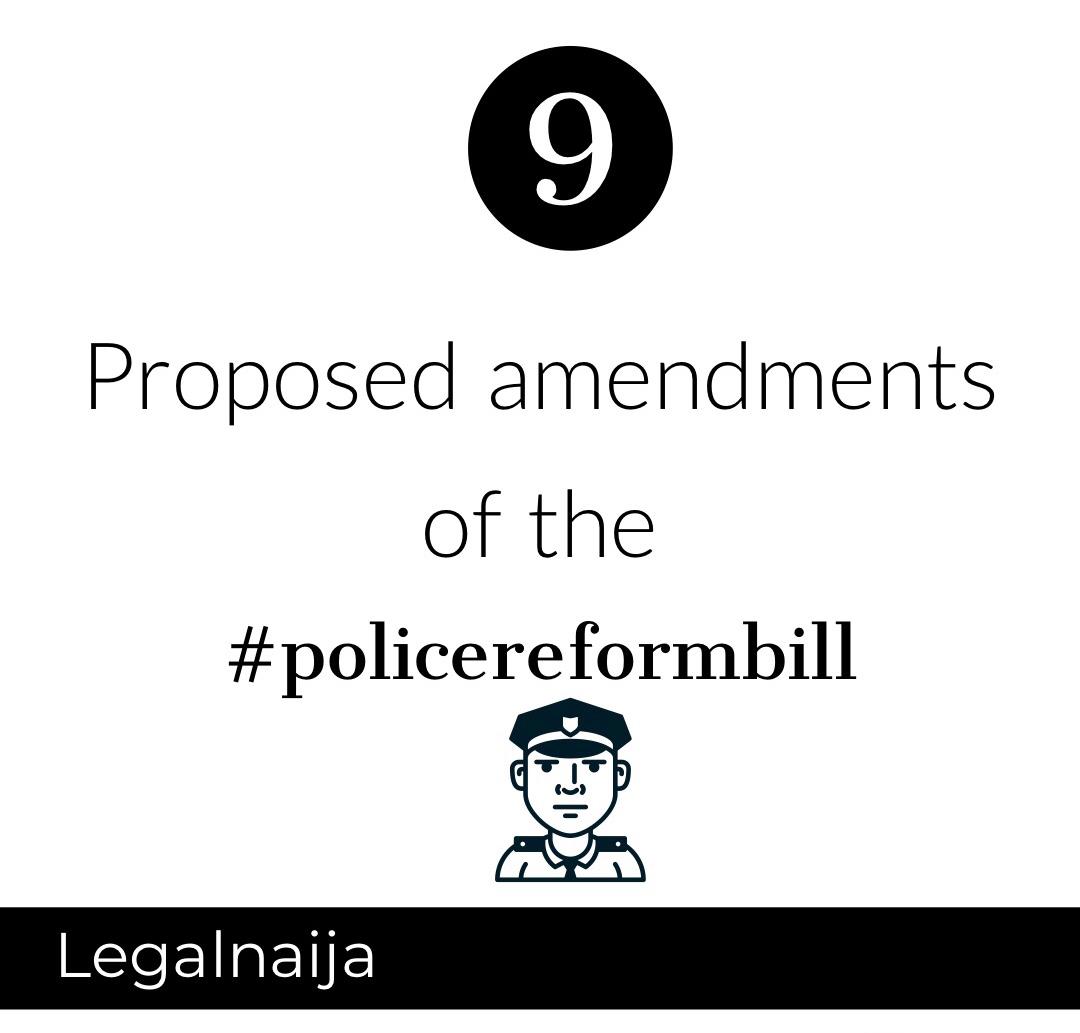
Objectives
of the Bill
of the Bill
The Bill outlines its objectives to be
i.
To ensure a people
friendly Nigerian Police which embodies the values of accountability, fairness,
justice and equity in Police operations;
To ensure a people
friendly Nigerian Police which embodies the values of accountability, fairness,
justice and equity in Police operations;
ii.
Ensure Police
responsiveness;
Ensure Police
responsiveness;
iii.
Ensure respect by
Police of the dignity of all persons;
Ensure respect by
Police of the dignity of all persons;
iv.
Safeguard of the
fundamental rights as contained in the Constitution;
Safeguard of the
fundamental rights as contained in the Constitution;
v.
Fostering cooperation
and partnerships between the Police and the communities it serves;
Fostering cooperation
and partnerships between the Police and the communities it serves;
vi.
Promote the respect
for victims of crime and an understanding of their needs.
Promote the respect
for victims of crime and an understanding of their needs.
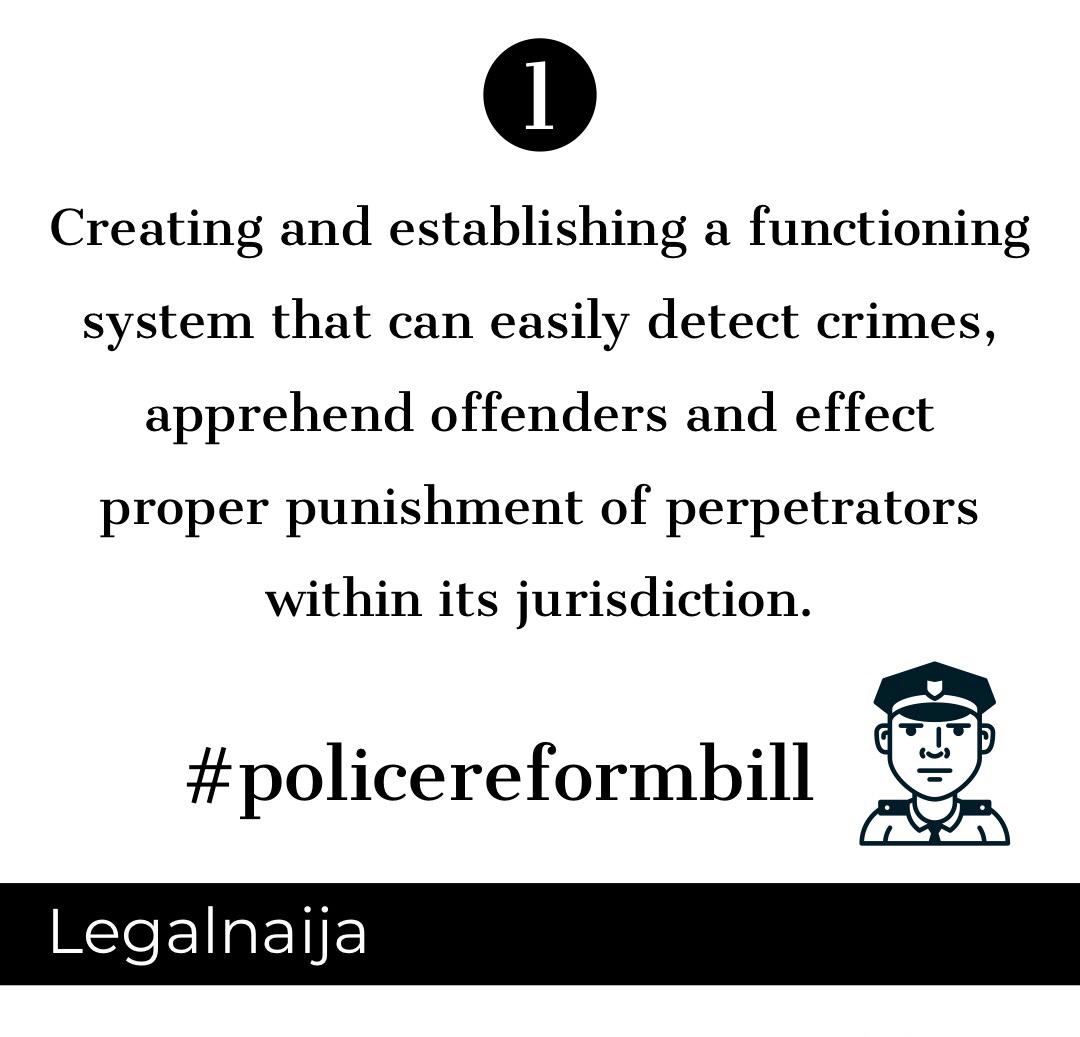
Duties
of the Police
of the Police
Section 4, of the existing Police Act states
the duties of the Police include the prevention and detection of crime, the
apprehension of offenders, the preservation of law and order, the protection of
life and property and the due
enforcement of all laws and regulations with which they are directly
charged, and shall perform such military
duties within or outside Nigeria as may be required of them by, or under the authority of this or
any other Act.
the duties of the Police include the prevention and detection of crime, the
apprehension of offenders, the preservation of law and order, the protection of
life and property and the due
enforcement of all laws and regulations with which they are directly
charged, and shall perform such military
duties within or outside Nigeria as may be required of them by, or under the authority of this or
any other Act.
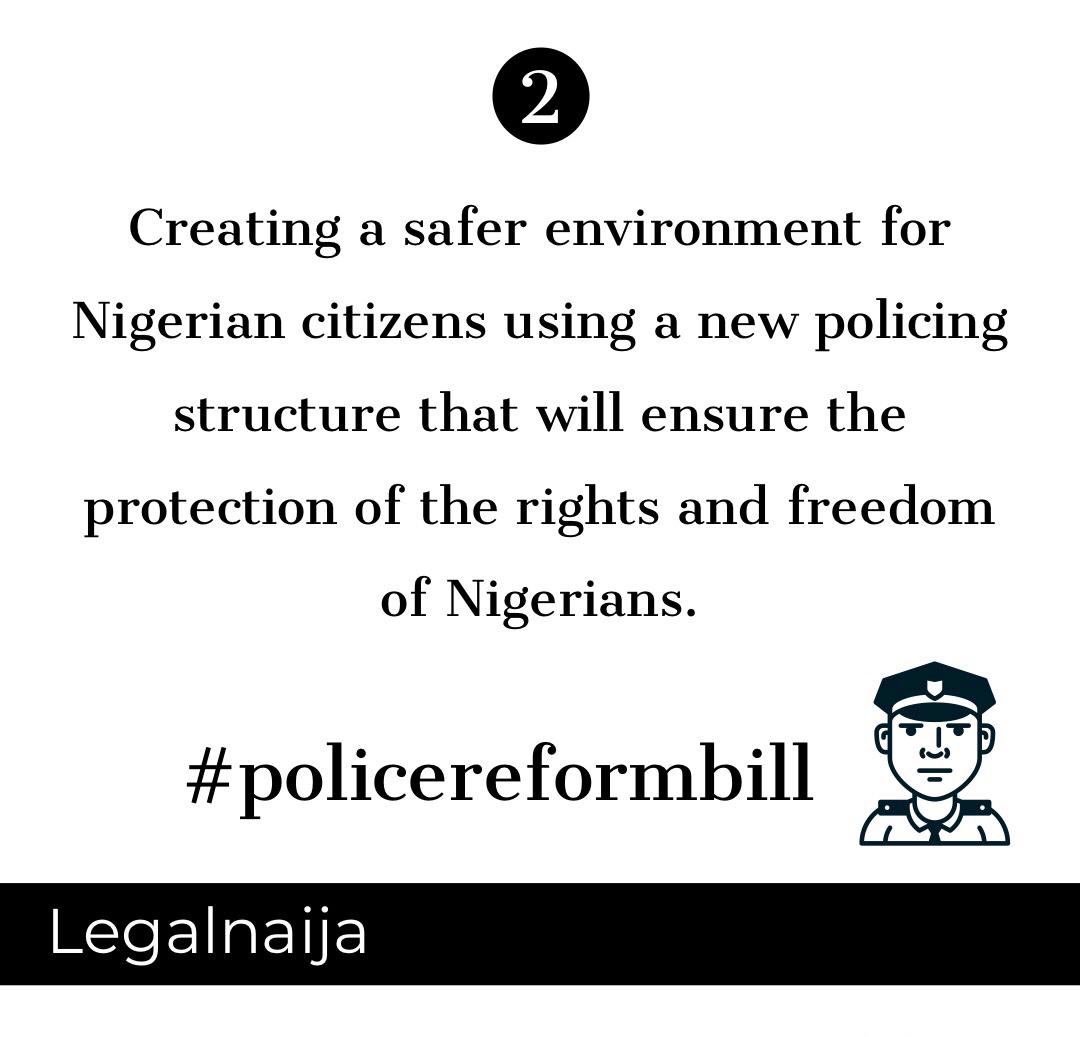
However, the new Police Reform Bill proposes
additional duties to include;
additional duties to include;
i.
Protection of the
rights and freedom of every person in Nigeria as provided in the Constitution,
the African Charter on Human and Peoples’ Right, and any other law;
ii.
Provision of humanitarian
assistance for citizen(s), facilitation of movement on highways etc. without
subjecting citizens to extortion, and adoption of communist partnerships.
iii.
Adoption of community
partnership in the performance of the duties provided under this section

Appointment
of Inspector General
of Inspector General
Clause 7 provides for the appointment
procedure and qualification requirements for the person to be appointed as IGP,
such officer must be a Senior Police Officer not below the rank of an Assistant
Inspector General of Police with the requisite academic qualifications of not
less than a first degree or its equivalent in addition to professional and
management experience. Also upon appointment, the Bill proposes that the IGP
will have a 5-year tenure.
procedure and qualification requirements for the person to be appointed as IGP,
such officer must be a Senior Police Officer not below the rank of an Assistant
Inspector General of Police with the requisite academic qualifications of not
less than a first degree or its equivalent in addition to professional and
management experience. Also upon appointment, the Bill proposes that the IGP
will have a 5-year tenure.
Clause 10 defines the powers and duties of
the IGP, which includes development of a yearly financial plan for the Police
and establishment of Police training centres.
the IGP, which includes development of a yearly financial plan for the Police
and establishment of Police training centres.
While Clause 12 mandates State Commissioners
to establish community police fora in the States under their command subject to
the directions of the State Governor.
to establish community police fora in the States under their command subject to
the directions of the State Governor.
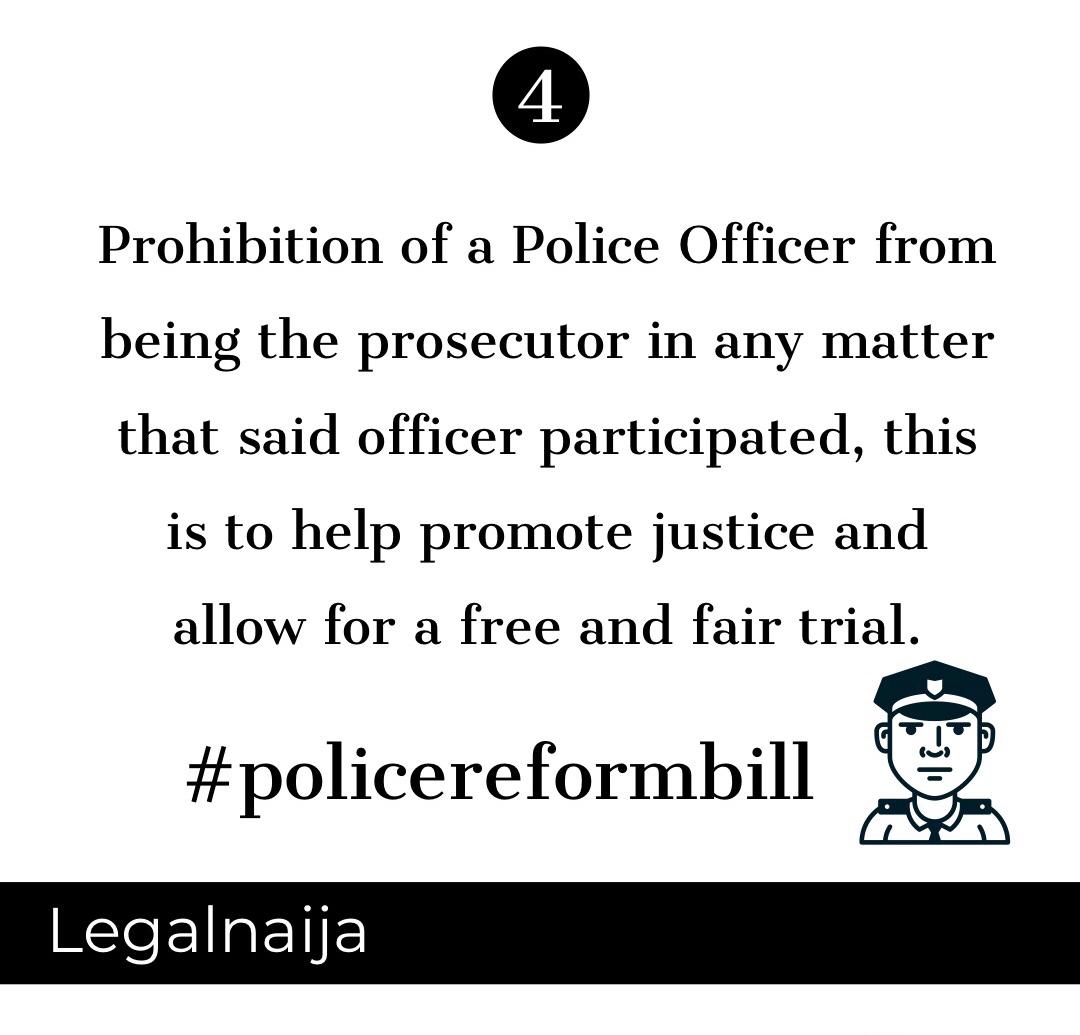
Powers
of the Police
of the Police
i.
Clause
20 of the Bill attempts to qualify the power of prosecution in section 23 of
the Act by subjecting the police officer’s power to conduct prosecutions to
relevant criminal procedure laws in force at the federal level and in a state
regarding prosecution by nonqualified legal practitioners. It further requires
that every Police Division have at least one police officer that is qualified
to practice as legal practitioner.
Clause
20 of the Bill attempts to qualify the power of prosecution in section 23 of
the Act by subjecting the police officer’s power to conduct prosecutions to
relevant criminal procedure laws in force at the federal level and in a state
regarding prosecution by nonqualified legal practitioners. It further requires
that every Police Division have at least one police officer that is qualified
to practice as legal practitioner.
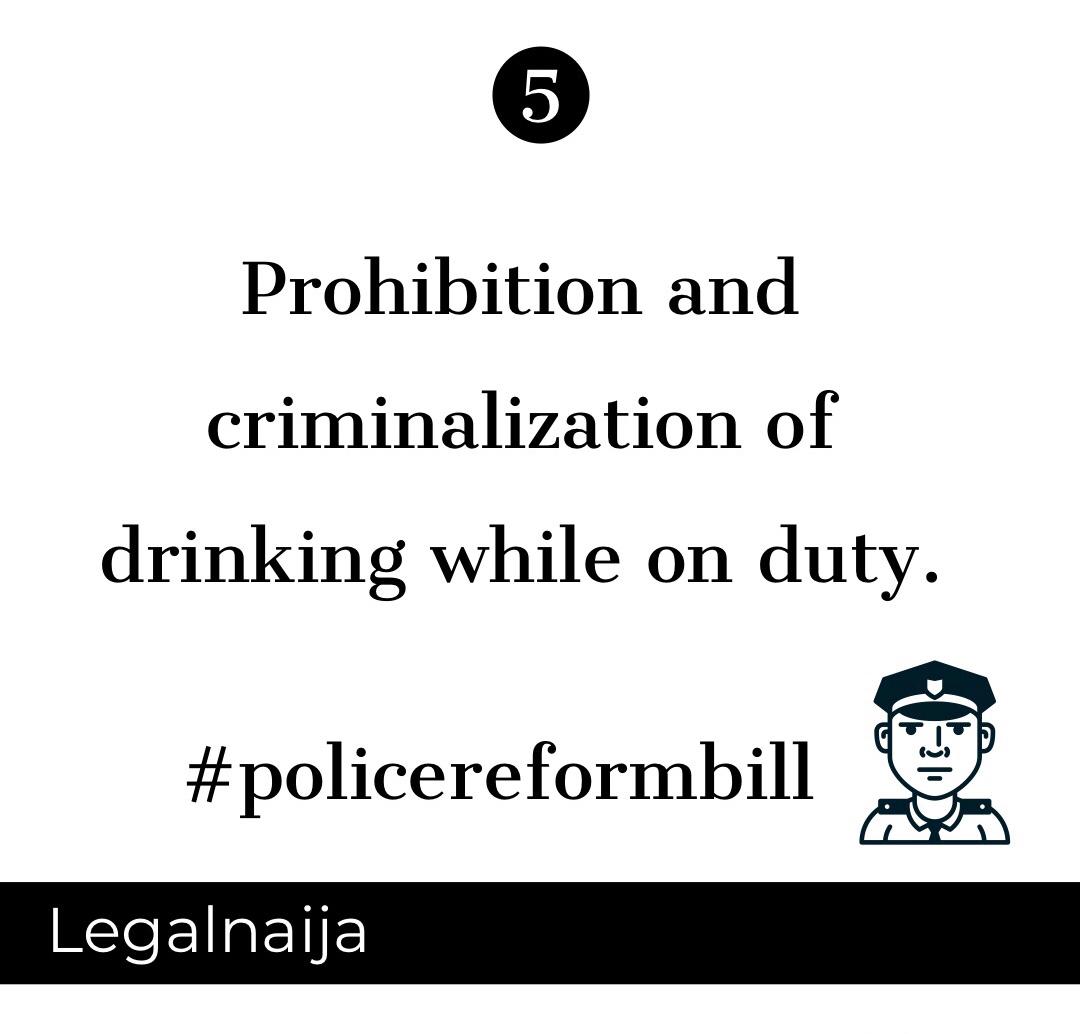
ii.
Clause
25 requires that persons arrested are taken into custody before taking such
persons before a court of competent jurisdiction with respect to the offence
with which he is charged. Same of which must be done as soon as practicable.
The Clause also stipulates further provisions for bail.
Clause
25 requires that persons arrested are taken into custody before taking such
persons before a court of competent jurisdiction with respect to the offence
with which he is charged. Same of which must be done as soon as practicable.
The Clause also stipulates further provisions for bail.
iii.
Clause
26 provides for cases where the Police can apply for extension of detention or
remand of a suspect i.e. to preserve evidence or interrogate him/ her. In such
cases, the Police can apply to the court pursuant to section 293 of ACJA. Such
application must be made within 48 hours of the arrest. The Court must also
determine such application within 48 hours.
Clause
26 provides for cases where the Police can apply for extension of detention or
remand of a suspect i.e. to preserve evidence or interrogate him/ her. In such
cases, the Police can apply to the court pursuant to section 293 of ACJA. Such
application must be made within 48 hours of the arrest. The Court must also
determine such application within 48 hours.
iv.
Clause
29 provides for powers to search premises and includes a prohibition on
violation of human rights in the course of the search.
Clause
29 provides for powers to search premises and includes a prohibition on
violation of human rights in the course of the search.
v.
Clause
30 makes provisions on search warrant safeguards i.e. provisions on conditions
to be satisfied before a search warrant can be issued e.g. the grounds for the
warrant, the premises to be searched, etc.
Clause
30 makes provisions on search warrant safeguards i.e. provisions on conditions
to be satisfied before a search warrant can be issued e.g. the grounds for the
warrant, the premises to be searched, etc.
vi.
Clause
31 provides for issue and execution of search warrants and its endorsement upon
execution.
Clause
31 provides for issue and execution of search warrants and its endorsement upon
execution.
vii.
Clause
32 provides for power to detain and search a suspected person or vehicle:
Clause
32 provides for power to detain and search a suspected person or vehicle:
• Where the police
officer has reasonable grounds for suspecting that a person is in possession of
or conveying anything the officer is believed to be stolen or unlawfully
obtained;
officer has reasonable grounds for suspecting that a person is in possession of
or conveying anything the officer is believed to be stolen or unlawfully
obtained;
• Where reasonable
grounds for suspicion exists that such person or vehicle is carrying an
unlawful article;
grounds for suspicion exists that such person or vehicle is carrying an
unlawful article;
• Where reasonable
grounds for suspicion that incidents involving serious violence may take place
within a locality;
grounds for suspicion that incidents involving serious violence may take place
within a locality;
• Where information
has been received as to a description of an article being carried or of a
suspected offender; and
has been received as to a description of an article being carried or of a
suspected offender; and
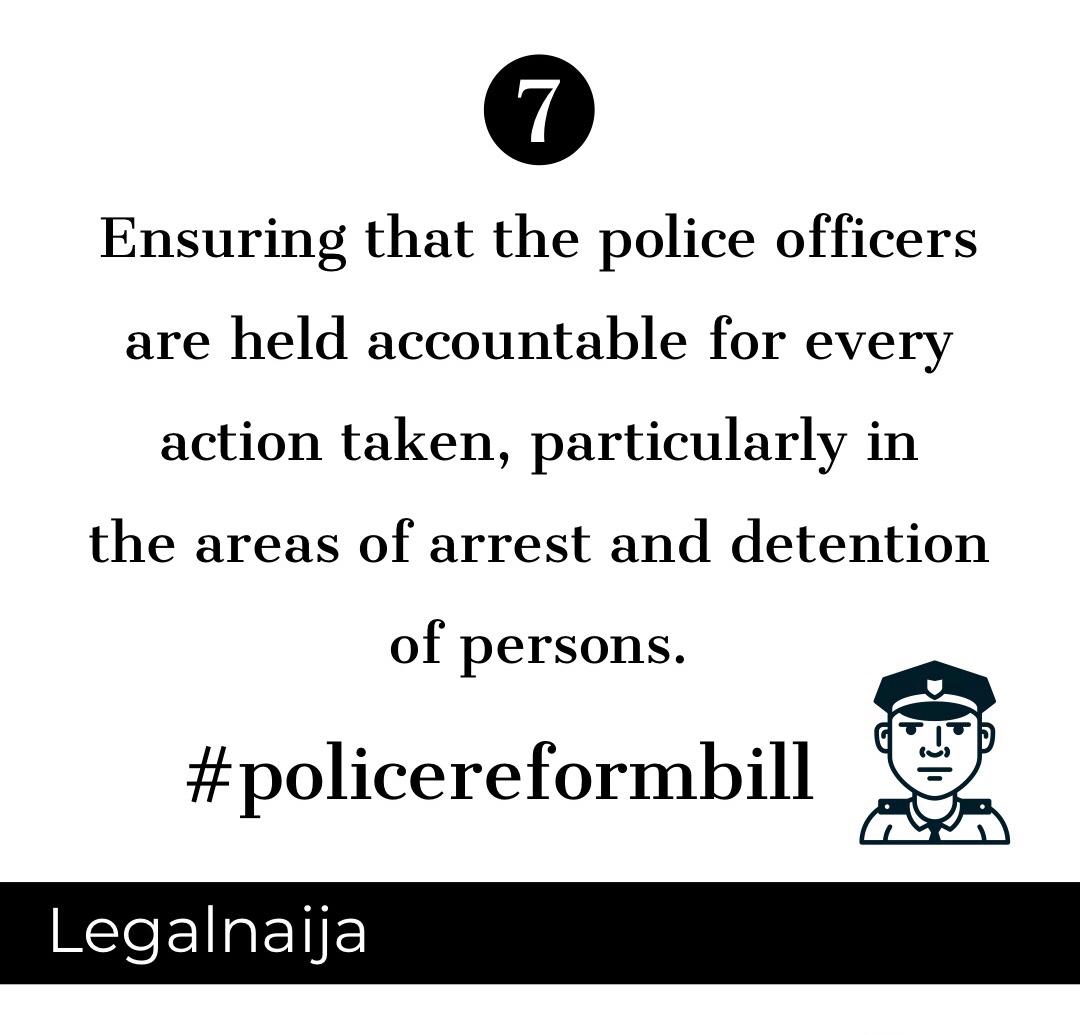
A person is carrying a certain type of
article at an unusual time or in a place where a number of burglaries or thefts
are known to have taken place recently It adds however in Clause 33 that
certain personal attributes shall not be grounds for reasonable suspicion,
including:
article at an unusual time or in a place where a number of burglaries or thefts
are known to have taken place recently It adds however in Clause 33 that
certain personal attributes shall not be grounds for reasonable suspicion,
including:
i.
a person’s colour,
age, hairstyle or manner of dress;
a person’s colour,
age, hairstyle or manner of dress;
ii.
previous conviction
for possession of an unlawful article; or
previous conviction
for possession of an unlawful article; or
iii.
stereotyped images of
certain persons or groups as more likely to be committing offences.
stereotyped images of
certain persons or groups as more likely to be committing offences.
viii.
Clause
34 provides for actions to be carried out by a police officer before a search
occurs i.e. the Officer must be in uniform and wear a visible Police identity
card and must inform the person in charge of the vehicle of his/her name,
police station, object and grounds of the search.
Clause
34 provides for actions to be carried out by a police officer before a search
occurs i.e. the Officer must be in uniform and wear a visible Police identity
card and must inform the person in charge of the vehicle of his/her name,
police station, object and grounds of the search.
ix.
Clause
36 mandates the Officer to record details of the search and provide a copy to
the person to be searched while Clause 37 provides for a National Search Record
Form containing details of a search.
Clause
36 mandates the Officer to record details of the search and provide a copy to
the person to be searched while Clause 37 provides for a National Search Record
Form containing details of a search.
x.
Clause
38 provides for powers to take fingerprints, photographs, measurements.
Clause
38 provides for powers to take fingerprints, photographs, measurements.
Note: Power to take finger prints etc. is
contained in section 15 of ACJA. Unlike
ACJA, the bill however further requires the Police to store such fingerprint
impressions and measurements in a retrievable format and hand over to a suspect
who has been discharged or acquitted. It also requires a police officer to
approach a court to compel a suspect in lawful custody who refuses to submit him/herself
for such records to be taken.
contained in section 15 of ACJA. Unlike
ACJA, the bill however further requires the Police to store such fingerprint
impressions and measurements in a retrievable format and hand over to a suspect
who has been discharged or acquitted. It also requires a police officer to
approach a court to compel a suspect in lawful custody who refuses to submit him/herself
for such records to be taken.

Public
Rallies & Processions
Rallies & Processions
Clause 39(3) prohibits the Inspector General
of Police or the Commissioner of Police or their lawful delegates from
unreasonably disallowing members of the public, the right to hold peaceful
rallies, processions and assemblies in public highways, buildings or spaces.
of Police or the Commissioner of Police or their lawful delegates from
unreasonably disallowing members of the public, the right to hold peaceful
rallies, processions and assemblies in public highways, buildings or spaces.
Subsection (4) provides for police personnel
to provide security cover for such meeting, rally or procession. In cases where
the organisation decides to proceed with a rally against Police advice, the
Police is required to obtain a court order to prevent the rally- Clause 39(5.)
to provide security cover for such meeting, rally or procession. In cases where
the organisation decides to proceed with a rally against Police advice, the
Police is required to obtain a court order to prevent the rally- Clause 39(5.)
Community
Policing Forums
Policing Forums
This is a new part establishing community
police forums, divisional and state community police boards to maintain
partnership between the community and the Police, promote communication,
improve rendering of police service, promote co-operation and improve
transparency and accountability in the provision of police services.
police forums, divisional and state community police boards to maintain
partnership between the community and the Police, promote communication,
improve rendering of police service, promote co-operation and improve
transparency and accountability in the provision of police services.
It shall be made up of representatives of the
local community in the state of jurisdiction.
local community in the state of jurisdiction.
The objectives of the forums and boards as
stated are to:
stated are to:
a. maintain a partnership between the
community and the Police;
community and the Police;
b. promote communication between Nigeria
Police and the community;
Police and the community;
c. promote co-operation between the Police
and the community in fulfilling the needs of the community regarding policing;
and the community in fulfilling the needs of the community regarding policing;
d. improve the rendering police service to
the community; and
the community; and
e. improve transparency and accountability in
the provision of police services to the community.
the provision of police services to the community.
This bill adds that this provision shall not
prevent Police liaison with the community by means other than Community Police
Forums and Boards.
prevent Police liaison with the community by means other than Community Police
Forums and Boards.
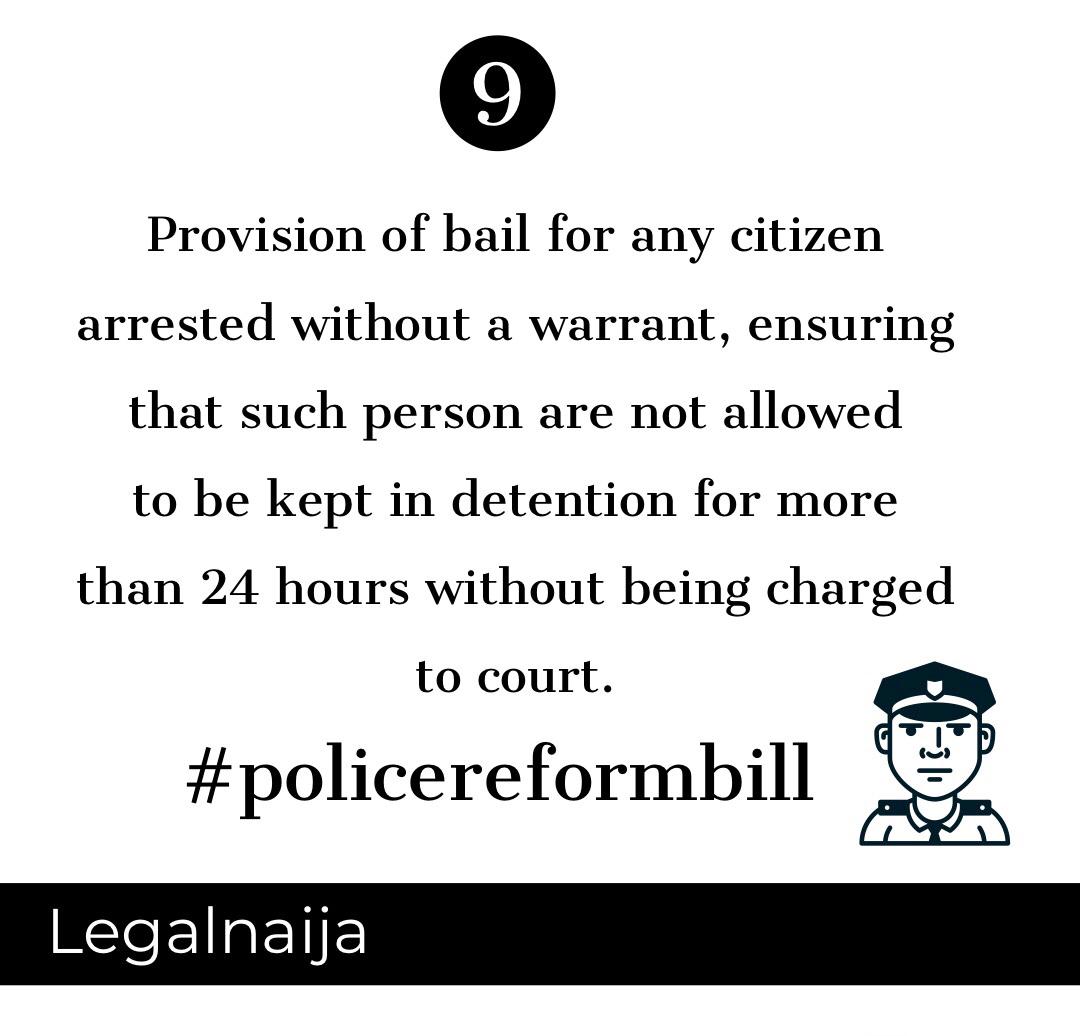
Police
Public Complaints and Discipline
Public Complaints and Discipline
This part establishes the Police Complaints
Response Unit to receive complaints about police misconduct from the public or
other police officers. The Bill also looks to enshrine the existing Police
Complaints Unit within the legal framework governing the Police and provides a
procedure for investigations. It mandates the Inspector-General of Police to
establish a Police Complaints Response Unit in each of the Police Commands in
all the State of Federation.
Response Unit to receive complaints about police misconduct from the public or
other police officers. The Bill also looks to enshrine the existing Police
Complaints Unit within the legal framework governing the Police and provides a
procedure for investigations. It mandates the Inspector-General of Police to
establish a Police Complaints Response Unit in each of the Police Commands in
all the State of Federation.
The Unit is mandated in monitor
investigations initiated by the unit as well as conduct investigations. The Unit may receive: »» any complaint
alleging that the conduct complained of resulted in the death or serious injury
or other gross human rights violation; »» any complaint showing that a police
officer is involved in an act constituting professional misconduct. – If the
investigations reveal a criminal offence, a copy of the report shall be sent to
the Director of Public Prosecutions for prosecution. – If it is an offence
against discipline, it shall be sent to the appropriate Police or oversight
authority for proper disciplinary action – If it reveals false information
against a police officer, then the complainant shall be tried according to
relevant laws in force.
investigations initiated by the unit as well as conduct investigations. The Unit may receive: »» any complaint
alleging that the conduct complained of resulted in the death or serious injury
or other gross human rights violation; »» any complaint showing that a police
officer is involved in an act constituting professional misconduct. – If the
investigations reveal a criminal offence, a copy of the report shall be sent to
the Director of Public Prosecutions for prosecution. – If it is an offence
against discipline, it shall be sent to the appropriate Police or oversight
authority for proper disciplinary action – If it reveals false information
against a police officer, then the complainant shall be tried according to
relevant laws in force.
@Legalnaija
For
Further reading see PLAC
( Policy and Legal Advocacy Centre (PLAC) is a Non-Governmental Organisation
Promoting Good Governance and Citizen’s Access in Nigeria)
Further reading see PLAC
( Policy and Legal Advocacy Centre (PLAC) is a Non-Governmental Organisation
Promoting Good Governance and Citizen’s Access in Nigeria)
